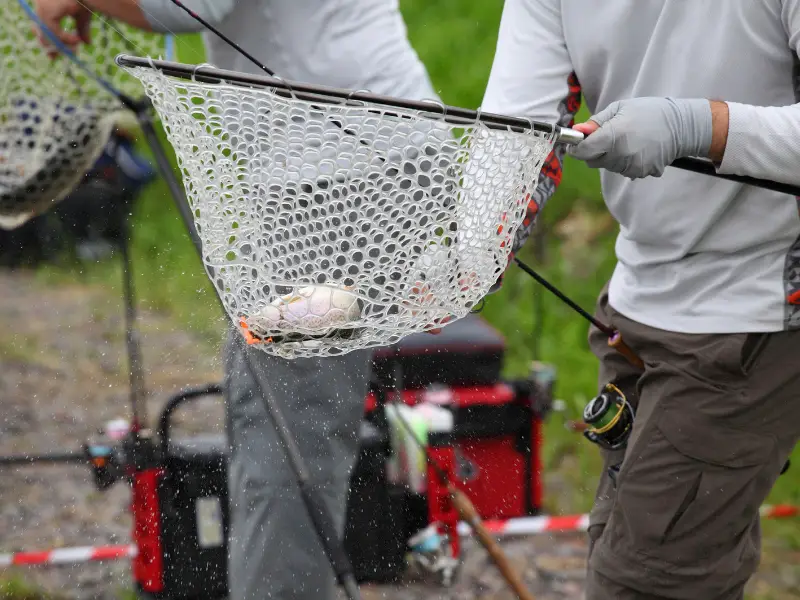Fishing might seem like a relaxing and leisurely activity, but that quickly changes once anglers switch to tournament fishing. If you’re thinking of making the switch, you’re probably wondering how fishing tournaments work.
Most fishing tournaments offer competitions for individuals fishing from land and teams fishing from boats. A fishing tournament is an event where anglers compete against one another. Most fishing tournaments last between 6 and 10 hours, and the goal is to end the day with the heaviest fish limit.
Keep reading to learn more about fishing tournaments and how they work. This article will also tell you how to prepare for a fishing tournament and what a tournament day looks like.
What Is a Fishing Tournament?
A fishing tournament called a derby, is an organized competition among anglers. Fishing tournaments typically occur on a clearly defined body of water and under specific rules. These competitions take place on or along the edge of rivers, lakes, oceans, and ice-covered bodies of water.
Fishing tournaments evolved from small, locally-held fishing contests into large competitive tournaments. Fishermen competing in these events may be professionals supported by commercial endorsements.
How Does a Fishing Tournament Work?

A fishing tournament is an event where anglers compete against one another during an assigned period of time, typically 8 hours. Fishing tournaments usually start with the first light and last from 6 to 10 hours, depending on the organization hosting the event and the time of the year.
Most fishing tournaments offer competitions for individuals fishing from land and teams fishing from boats. The goal of fishing competitions is to end the day with the heaviest limit of fish.
Depending on how many days the fishing tournament lasts, the angler with the heaviest weight of the day or days wins the competition.
During the fishing tournament, anglers will catch as many fish as possible. When anglers reach tournament limits, they can cull or replace the smallest fish with bigger ones in an attempt to obtain the heaviest limit.
While the tournament lasts, the caught fish is kept alive in a Livewell which is full of water and aerated to keep the fish alive. Weighing dead fish leads to penalties, so anglers must ensure the fish is alive and well.
Basic Fishing Tournament Format
The majority of fishing tournaments hold competitions between individual anglers or two-person teams. Almost all tournaments have a monetary entry fee for individuals or team members.
Most fishing competitions give cash prizes to the top three anglers. There is also a bonus for the angler who catches the largest fish of the tournament. In some instances, top anglers earn qualifications for higher-level fishing tournaments.
Most tournaments are organized to target a single fish species like smallmouth bass or carp. Some fishing tournaments will allow anglers to catch several species from the same class. In this case, both smallmouth and largemouth bass count.
An angler with the highest overall weight of a Livewell wins a fishing tournament. Most fishing tournaments last from 6 to 10 hours, and there is a number of fish each boat or angler is allowed to catch. In bass tournaments, the standard limit is five fish, and they must measure at least 12 inches long.
As the tournament progresses and anglers catch larger fish, they cull the smallest fish in the Livewell and release it back into the water. The organizers of fishing tournaments have high standards regarding fish welfare, and any dead fish on the weigh-in will be penalized.
How to Prepare for a Fishing Tournament
Once you determine what type of fishing tournament is best for you, it’s time to prepare for the big day. Here’s everything you need to do:
Scout the Tournament Location
The best way to prepare for a fishing tournament is to scout and fish that body of water as much as possible before the tournament. Use a depth finder and charts to look for underwater structures or drop-offs, and most importantly, pay attention to fish patterns.
The better part of your fishing tournament will happen in the morning, so learn what lures and presentations are the most effective in the early morning. Observe how fish move as the day progresses to increase your chances of catching fish in the afternoon.
Be Fast and Flexible
Speed is one of the most important factors in tournament fishing because of time limitations. Tournament anglers don’t have the luxury of wasting time at unproductive spots.
Use fast-moving and noisy lures like crankbaits and buzz baits to attract aggressive fish that you can quickly add to a Livewell. As fish go into a slower midday pattern, use slower lures like jigs and worms to get a bite.
When scouting the tournament location, learn which fast and slow lures work the best and use them on the day of the tournament.
If the bite is slow, move quickly to another location before other competitors take productive waters. Staying too long on a previously productive fishing spot is a waste of time and could cost you the prize.
An adaptive mindset and fast reaction will prepare you for specific tournament conditions and help you become a better tournament angler.
Conclusion
A typical fishing tournament starts in the early morning unless you’re targeting catfish, as these competitions are often held at night. To increase your chances of success, create a list of priority spots because competitors may claim your favorite fishing location faster than you.
The majority of fishing tournaments have a monetary entry fee and offer cash prizes to the top three anglers. In many cases, a bonus is awarded to the fisherman who catches the largest fish in the tournament.
To win a fishing tournament, you must come prepared. The best way to do that is to familiarize yourself with the tournament location and fish in it as much as possible before the competition.